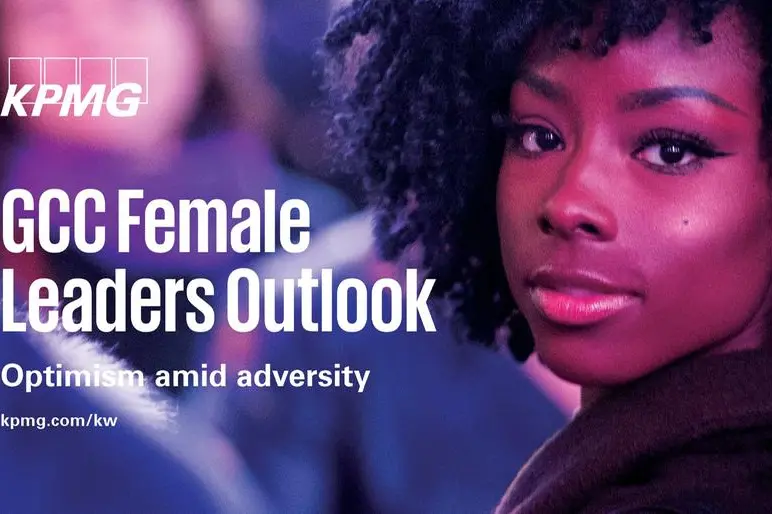PHOTO
- KPMG Kuwait’s latest thought leadership GCC Female Leaders Outlook 2022 offers prime input from 60+ female leaders in the GCC region on six major aspects. The report was formerly published under the banner of KPMG Global Female Leaders Outlook and is now more attuned to cater to the needs of the leaders/organizations in the GCC area.
Kuwait — In view of broadening demand from leaders/organizations in the GCC countries, KPMG Kuwait published the first edition of its flagship publication GCC Female Leaders Outlook 2022. The report is an insightful compilation of the opinions and outlook of more than 60 female leaders from the GCC region on six areas, namely: (i) Growth; (ii) New Work; (iii) Digitalization and Cyber; (iv) Innovation and Technology; (v) Purpose and ESG; and (vi) Career and Motivation.
The report highlights that the GCC Female Leaders are confident about the growth prospects of their countries, sectors and companies even in the face of disruption. They are cognizant of key threats such as talent and technology risks, and are taking swift measures to stay on top of them.
Speaking about the report, Karen Watts, Partner — Quality and Risk, KPMG in Kuwait said, “I am happy to announce the launch of the GCC Female Leaders Outlook 2022. Over the years, we have issued three editions of the Global Female Leaders Outlook, with the intention of voicing the perspectives of women leaders on several areas that could impact them as an individual and as part of an organization. With this report, however, we have tried to deliver something that is more relevant and in line with the GCC Female Leaders’ requirements, considering the same has shot up in recent years. I hope our readers will find it helpful and put it to good use. I would also like to thank the female leaders who participated in our thought leadership and provided us with their valuable insights, which helped us with an accurate representation of the region.”
The publication features five interviews with Haya Ayman Boodai, Board Member, Touristic Enterprises Company & Dhaman Health Assurance Hospitals Company, Manal Alrubaian, General Internal Auditor, Kuwait International Bank, May Dashti, Information Security AGM, Gulf Bank, Rama Issam, Senior Manager — IT Quality Management Division, Boubyan Bank, and Salma Al-Hajjaj , GM — Human Resources at Gulf Bank to add more regional specificity to the outlook.
The one-on-one interactions cover the present market scenario, impact of the COVID-19 crisis, work-life balance and, more importantly, the journey the interviewees took to become leaders in their organizations.
In working on the publication, the following key themes emerged:
Optimism amid adversity: While confident that the growth prospects will mature in their favor, female leaders are not undermining the risks in talent and emerging technology. Haya Ayman Boodai acknowledged the risks associated with talent and quoted, “People are key assets for any organization and the success and failure of any company is directly linked with its people. The report highlights that more than 90% of the GCC Female Leaders feel that their countries’ growth prospects will come to fruition over the next three years despite prevailing challenges.
Hiring for a new reality: Female leaders are searching for more talent to fulfill the needs of digital. They are focusing on creating the right employee value proposition as well as a set of policies and culture that will support work-life balance. Talking about how work has changed after the COVID-19 crisis with regard to new talent, Salma Al-Hajjaj said, “Post pandemic, there is a belief that work can be done from anywhere and hence flexible working hours and distance working should be considered moving forward.” The report mentions that a third of the leaders want to forge a culture that will promote employee well-being and are, hence, striving to create a framework around that.
Maintaining the pace of digitalization: Female leaders are eager to invest in digital opportunities and are considering adoption of a more aggressive approach to succeed in their digital investment strategy. “An organization’s digital transformation journey requires proper planning and the right leadership combined with regular monitoring,” said May Dashti emphasizing the importance of a good strategy. Adding to this, Manal Alrubaian commented, “Digital transformation is a challenge for any organization, and the main factor that can turn the challenge to motivation and opportunity is the presence of excellent expertise.”
Innovating for resilience: Female leaders believe innovation will be paramount in ensuring their organization’s post-pandemic survival and are using ‘fast-failing’ initiatives as a vehicle. Speaking about the role of innovation in the technology sector, Rama Issam said, “Innovation is a fundamental tool to survive and thrive in the technology sector, as banks aim to leverage technology to build wider a customer base and better customer relationships.”
Meeting ESG demands: Female leaders think ESG performance around ethnic, racial and gender concerns drives stakeholder attention. According to the report, eight in ten respondents feel that more effort should be made toward bridging the gender equality gap on a senior level. “We still have a long way to go in terms of minimizing the gender gap in technology but the effort is worth it as I strongly believe that diverse talent pools are effective,” added Rama Issam underlining the importance of having more women in technology/IT.
Charting a career growth path: Female leaders have plans in place to grow their careers despite top workplace concerns in behavior-related bias, preferential treatment and transparency around equal pay. “In recent years, I have observed more and more women getting into technical fields, such as information technology and medical sciences, among other areas, which used to be dominated by males. This type of balance is really important because I believe women can excel in any field of their choosing if they are given the opportunity to do so,” affirmed Haya Ayman Boodai. Supporting this, the findings in the GCC Female Leaders indicate that almost 80% of the GCC Female Leaders have a clear idea as to how they are going to progress their career in the next three years.
The report calls special attention to the gender gap in the digital era and points out that bridging it will require more than motivating women to take up a career in the digital economy. The report lays emphasis on bringing about a change in mindset that will support the roles women are playing now and will continue to, along with the emerging roles, in the new reality.
The results and findings published in the report are based on the Primary Research, Global Female Leaders Outlook 2021, HQ Middle East, with the participating female leaders belonging to Middle Eastern countries such as Kuwait, Bahrain, Oman, Qatar, Saudi Arabia, and the United Arab Emirates.
-Ends-



















